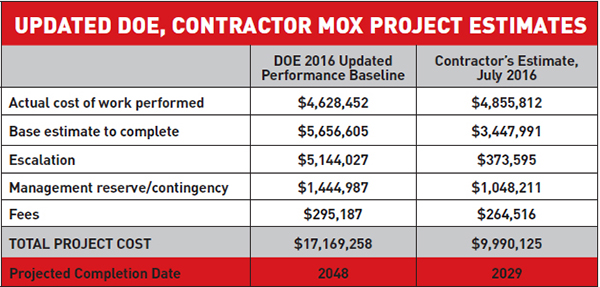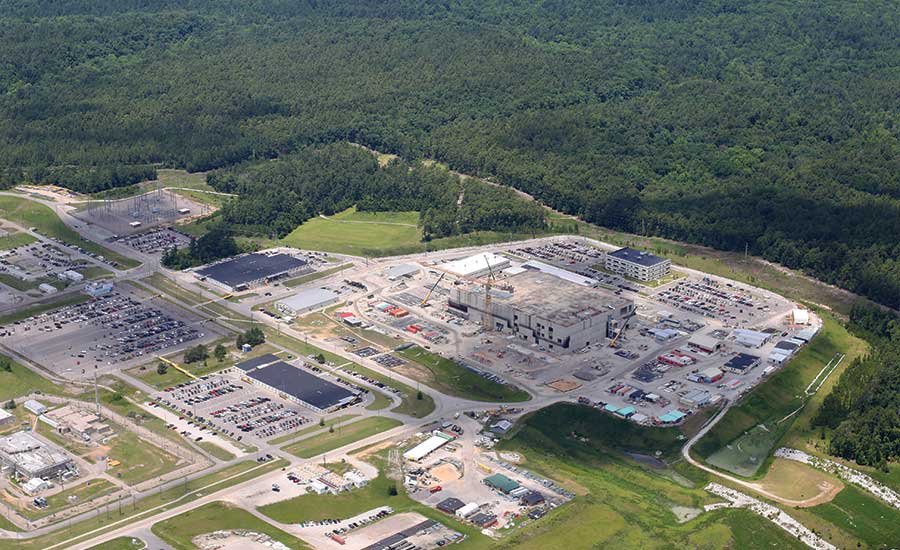An ongoing political battle between the Obama administration and Congress over construction of the budget-busting Mixed Oxide Fuel Fabrication Facility in South Carolina heated up after Oct. 3, when Vladimir Putin announced that Russia is suspending its participation in the international treaty governin g plutonium disposition that served as the project’s impetus.
g plutonium disposition that served as the project’s impetus.
The Russian president’s abrupt announcement further chilled relations between the U.S. and Russia, already cool from their respective approaches to the civil war in Syria. Putin cited the “inability of the U.S. to deliver on the obligation to dispose of excessive weapons plutonium under international treaties” as one rationale for the action. The South Carolina project, commonly called MOX, is billions of dollars over budget—how many billion is in dispute (see chart). Originally scheduled for completion in 2016, a recently released Dept. of Energy report indicates 2029 as the earliest estimated date for construction completion.

One of the troubled project’s staunchest defenders, Sen. Lindsey Graham (R-S.C.), blamed the Obama administration for the Russian action to suspend participation in the Plutonium Management and Disposition Agreement, enacted in 2000.

“Today’s news of Russia abandoning one of the most important underpinnings of our non-proliferation regime is just another example of how President Obama will be leaving office with the world a much more dangerous place than it was when he was elected,” Graham said in a statement.
“President Obama and his Dept. of Energy’s deliberate assault on the MOX program and South Carolina need to stop immediately,” Graham’s statement continued. “As it is, our next president will inherit a mess.”
“This is a huge wake-up call for this administration that its wrongheaded, obstinate approach to trying to terminate the MOX project is the wrong one,” David Blee, executive director of the United States Nuclear Infrastructure Council, a trade group representing the “nuclear supply-chain community,” told ENR.
Dr. Edwin Lyman, a senior scientist with the Union of Concerned Scientists and a project critic, countered, stating, “The U.S should immediately suspend construction of the MOX plant” as a result of Russia’s announcement.
“The withdrawal of Russia from the agreement pulls out one of the last legs from under those few remaining advocates for continued construction of the MOX plant,” Tom Clements of watchdog SRS Watch said in a statement to ENR.
DOE did not respond to ENR’s request for comment about Russia’s action in time for publication.
Two years ago, DOE began advocating for placing the MOX project into “cold standby” and, in 2016, began arguing to use a treatment regime called “downblending,” preparing the material for subsequent storage at the Waste Isolation Pilot Plant in New Mexico.
In the month prior to Russia’s announcement, more than one U.S. federal agency took aim at various aspects of the MOX project. In early September, DOE highlighted construction defects to an on-site media gathering.
Later, on Sept. 22, the Dept. of Justice intervened in a lawsuit originally filed under whistle-blower provisions of the False Claims Act, alleging a MOX supplier knowingly supplied deficient reinforcing steel to the project. Then, on Sept. 23, a DOE report provided the latest public budget and schedule estimates.
Escalation
The report, assuming funding at roughly $350 million, cites a July 2016 total project cost estimate by the contractor, CB&I AREVA MOX Services, of nearly $10 billion, with completion in 2029.
The DOE’s estimate differs, with a total project cost of more than $17.1 billion and final completion in 2048, due mostly to the agency’s use of a 4% cost escalation rate, while the contractor uses a figure of under 2%. Moreover, different assumptions about how much funding could be applied to construction also influenced the varying estimates.
CB&I did not respond to ENR’s requests for comment.
For now, project advocates may need to pin their MOX completion hopes on the next presidential administration. Baker Elmore, director of federal programs for the Nuclear Energy Institute, an industry group, says completing the project remains key to achieving the non-proliferation goals of the original treaty.
Noting Democratic nominee Hillary Clinton’s familiarity with the MOX project as a positive—she was secretary of state when the U.S. and Russia last renewed the agreement, in 2010—Elmore hopes any future administration is willing to consider completing the project.
“It’s going to be the next administration that’s going to need to make the call on this,” he noted.






Post a comment to this article
Report Abusive Comment